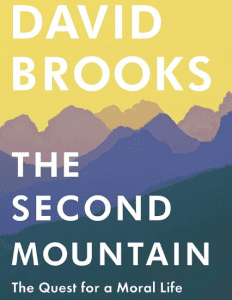 It is, one would think from listening to many so-called thinkers today, that Western Civilization is dead-and-gone, a subject beyond-which-we’ve-moved, and other cultural insults. That being educated into, or formed by, Western civilization is a dangerous illusionary world, a bad social imaginary. Not so, says David Brooks in The Second Mountain.
It is, one would think from listening to many so-called thinkers today, that Western Civilization is dead-and-gone, a subject beyond-which-we’ve-moved, and other cultural insults. That being educated into, or formed by, Western civilization is a dangerous illusionary world, a bad social imaginary. Not so, says David Brooks in The Second Mountain.
Many say that Western Civ and this kind of Great Books education is an elitist enterprise dominated by dead white males. But Western Civ was and remains radicalism—a subversive, revolutionary :ounterculture that makes it impossible to remain fat and happy within the status quo. Western Civ is Socrates, a man so dangerous, his city couldn’t tolerate him living within it. Western Civ offers ways to step out of the cave and see reality in its true colors, not just as the shadows that ideologues are content to see. Western Civ took me outside the assumption of my time, outside the values of the modern meritocracy d America’s worship of success. Western Civ inspired me to spend my life pursuing a philosophy—to spend decades trying to find a worldview that could handle the complexity of reality, but also offer a coherent vision that could frame my responses to events and guide me through the vicissitudes of life. Western Civ is the rebel base I return to when I want to recharge my dissatisfactions with the current world. Once you’ve had a glimpse of the highest peaks of the human experience, it’s hard to live permanently in the flatlands down below. It’s a little hard to be shallow later in life, no matter how inclined in that direction you might be.
Brooks was educated at the University of Chicago in those Great Books, most who criticize those Great Books have not read them, and in his teachers he was given a vision of life. This is what his teachers “taught” and what students “caught.”
- The scholarly tradition.
- A range of moral ecologies (Greek, Hebrew, Christian, Enlightenment, et al)
- A way to see.
- Intellectual courage.
- Emotional knowledge.
- New things to love.
I’m with Brooks. Great Books for me include Homer, Virgil, Dante, Milton, etc..
PS: The “Notes” at the back of this book cite the biblio information and page number of the quotations in the book. However, a big issue: I’d estimate 33% of the Notes references/information are missing.











